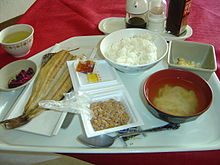Breakfast
The examples and perspective in this article may not represent a worldwide view of the subject. (April 2010) |

| Part of a series on |
| Meals |
|---|
 |
| Meals |
| Components and courses |
| Related concepts |
Breakfast is the first meal of the day. The word is a compound of "break" and "fast," referring to the conclusion of fasting since the previous day's last meal, hence "breaking the fast". Breakfast meals vary widely in different cultures around the world but often include a carbohydrate such as cereal or rice, fruit and/or vegetable, protein, sometimes a dairy product, and a drink. Nutritional experts have referred to breakfast as the most important meal of the day. This is based on studies of the large numbers of people in the West who skip breakfast, to adverse effect on their concentration, metabolism and weight.[1][2]
Typical breakfasts by world regions
Asia

- Japan. A traditional Japanese breakfast is based on rice, seafood, and fermented foods, which do not differ substantially from dishes eaten at other meals in Japanese cuisine. An exception is nattō (a type of fermented soybeans), which is often eaten for breakfast. A typical Japanese restaurant breakfast presentation would be miso soup, rice with nori or other garnishes, nattō, rice porridge, grilled fish, raw egg, and a pickled vegetable. The influence of Japanese travelers has made this traditional breakfast a standard option on the menus of many upscale hotels worldwide. It is common in Japanese households to include left-over items from the last evening's dinner in the next day's breakfast. Western breakfast foods such as toast and boiled or fried eggs are also common, and cereals are becoming popular. The typical breakfast beverage is green tea (traditional).[3][4]
Europe
- Denmark. A typical breakfast in Denmark consists of cereals or bread, accompanied by tea or coffee. Weekends or festive occasions may call for bread rolls (rundstykker) and possibly Danish pastries (wienerbrød) or a bitters, such as Gammel Dansk.[5]
- England. English people have traditionally eaten a hearty cooked breakfast, including such items as egg, sausage, bacon, black pudding, fried bread, mushrooms and tomatoes.
- France, Italy and Belgium. Typically a Continental Breakfast;, usually a black coffee, Café au lait or Tea served with either Bread with Butter and Jam(Tartine), or a Viennoiserie: a Croissant (sometimes served Butter & Jam), or Brioche, Pain au chocolat or Pain aux raisins[6][7].
- Germany & Austria. The typical German breakfast consists of bread or bread rolls with butter and jam, accompanied by tea or coffee as well as orange juice. A more hearty breakfast would include cold cuts, cheeses and a soft-boiled egg. Cereals, fruits and yogurt or curd are also popular options.[8] In Bavaria, Weißwurst-Frühstück is a popular regional variant. It consists of a special sausage (Weißwurst), sweet mustard, a pretzel and optionally a pint of wheat beer.[9]
North America & Caribbean
- Cuba. Breakfast in urban areas traditionally consisted of café con leche that was sweetened and included a pinch of salt. Toasted buttered Cuban bread, cut into lengths, was dunked in the coffee. In rural Cuba, farmers ate roasted pork, beans and white rice, café con leche and cuajada sweetened with caramel.[10]
- United States The daily breakfast in many homes consists of porridge or cereal with milk, coffee and/or fruit juice (especially orange juice), and sometimes toast or fruit. Many households also eat prepackaged toaster pastries, savory turnovers, or waffles that are kept frozen until right before serving. A cup of coffee with one or more donuts is common for commuters, as are fast food breakfast sandwiches. On weekends and other occasions when time is less of a factor, some form of full breakfast may be eaten.
History
Breakfast has commonly been practiced worldwide and is a concept easily transferred between cultures, but there have been many regional interpretations over the years. In Medieval Europe, for instance, the basic format of meals differed from what is currently 'standard', in that only two meals were to be had – a heavy dinner at noon and a light supper, largely due to the influence of the Church.
However, exceptions existed, most notably for children and the infirm. They were allowed a small breakfast meal, and many labourers, farmers, and other physical workers also took the meal despite criticism and social pressure on them not to, and by the 15th century even the nobility had begun to ignore the rules and mores of polite society and took breakfast.[11]
Special occasions
The serving of a pancake breakfast is traditional on Pancake Day (Shrove Tuesday), and some celebrate a festive breakfast on Christmas morning.[citation needed]
See also
- Breakfast television
- Full English breakfast
- Irish breakfast
- Ulster Fry
- Midnight breakfast
- Wedding breakfast
- Brunch
References
- ^ "Why is breakfast the most important meal of the day?". Mayo Clinic. Retrieved 2009-06-03.
- ^ "Breakfast is 'most important meal'". BBC. 7 March 2003. Retrieved 2009-06-03.
- ^ Quinzio, Jeri. "Waking up to breakfast in Japan". TravelLady Magazine. Retrieved April 12, 2010.
- ^ Yoshizuka, Setsuko. "Traditional Japanese Breakfast". About.com. Retrieved April12, 2010.
{{cite web}}: Check date values in:|accessdate=(help) - ^ "Danish Food Culture: Breakfast". Denmark.dk. Retrieved 2009-02-28.
- ^ "French Food & Cook: "French Breakfast - What we eat in France for breakfast"". Retrieved 2010-05-29.
- ^ "CusineNet Digest: "Breakfast in France, Italy, Belgium, and Luxembourg"". Retrieved 2010-05-29.
- ^ "Goethe-Institut Irland: Deutsche Essgewohnheiten". Retrieved 2010-05-16.
- ^ ""Description of a Weißwurst-Frühstück on kochbar.de". Retrieved 2010-05-16.
- ^ Grupo 2: - Span201.002 - Patterson
- ^ Food in Medieval Times, M. Adamson, Greenwood 2004
Further reading
Rampersaud G.C., Pereira M.A., Girard B.L., Adams J. and Metzl J.D.; Breakfast habits, nutritional status, body weight, and academic performance in children and adolescents. J. Am. Diet. Assoc., May; 105(5):743-60, 2005. Abstract in PubMed
